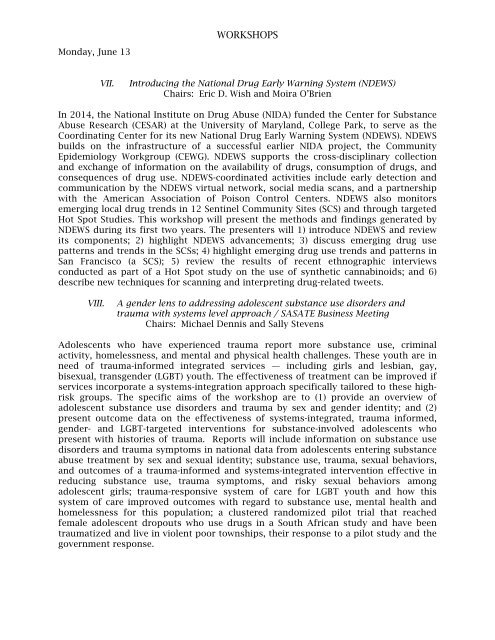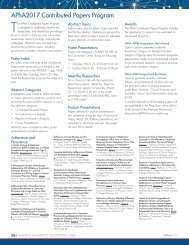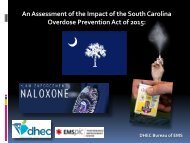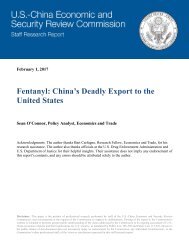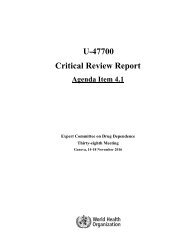CPDD 78th Annual Scientific Meeting Program
2016-78th-CPDD-Program-Book-6-07-16FINAL
2016-78th-CPDD-Program-Book-6-07-16FINAL
You also want an ePaper? Increase the reach of your titles
YUMPU automatically turns print PDFs into web optimized ePapers that Google loves.
WORKSHOPS<br />
Monday, June 13<br />
VII.<br />
Introducing the National Drug Early Warning System (NDEWS)<br />
Chairs: Eric D. Wish and Moira O’Brien<br />
In 2014, the National Institute on Drug Abuse (NIDA) funded the Center for Substance<br />
Abuse Research (CESAR) at the University of Maryland, College Park, to serve as the<br />
Coordinating Center for its new National Drug Early Warning System (NDEWS). NDEWS<br />
builds on the infrastructure of a successful earlier NIDA project, the Community<br />
Epidemiology Workgroup (CEWG). NDEWS supports the cross-disciplinary collection<br />
and exchange of information on the availability of drugs, consumption of drugs, and<br />
consequences of drug use. NDEWS-coordinated activities include early detection and<br />
communication by the NDEWS virtual network, social media scans, and a partnership<br />
with the American Association of Poison Control Centers. NDEWS also monitors<br />
emerging local drug trends in 12 Sentinel Community Sites (SCS) and through targeted<br />
Hot Spot Studies. This workshop will present the methods and findings generated by<br />
NDEWS during its first two years. The presenters will 1) introduce NDEWS and review<br />
its components; 2) highlight NDEWS advancements; 3) discuss emerging drug use<br />
patterns and trends in the SCSs; 4) highlight emerging drug use trends and patterns in<br />
San Francisco (a SCS); 5) review the results of recent ethnographic interviews<br />
conducted as part of a Hot Spot study on the use of synthetic cannabinoids; and 6)<br />
describe new techniques for scanning and interpreting drug-related tweets.<br />
VIII.<br />
A gender lens to addressing adolescent substance use disorders and<br />
trauma with systems level approach / SASATE Business <strong>Meeting</strong><br />
Chairs: Michael Dennis and Sally Stevens<br />
Adolescents who have experienced trauma report more substance use, criminal<br />
activity, homelessness, and mental and physical health challenges. These youth are in<br />
need of trauma-informed integrated services — including girls and lesbian, gay,<br />
bisexual, transgender (LGBT) youth. The effectiveness of treatment can be improved if<br />
services incorporate a systems-integration approach specifically tailored to these highrisk<br />
groups. The specific aims of the workshop are to (1) provide an overview of<br />
adolescent substance use disorders and trauma by sex and gender identity; and (2)<br />
present outcome data on the effectiveness of systems-integrated, trauma informed,<br />
gender- and LGBT-targeted interventions for substance-involved adolescents who<br />
present with histories of trauma. Reports will include information on substance use<br />
disorders and trauma symptoms in national data from adolescents entering substance<br />
abuse treatment by sex and sexual identity; substance use, trauma, sexual behaviors,<br />
and outcomes of a trauma-informed and systems-integrated intervention effective in<br />
reducing substance use, trauma symptoms, and risky sexual behaviors among<br />
adolescent girls; trauma-responsive system of care for LGBT youth and how this<br />
system of care improved outcomes with regard to substance use, mental health and<br />
homelessness for this population; a clustered randomized pilot trial that reached<br />
female adolescent dropouts who use drugs in a South African study and have been<br />
traumatized and live in violent poor townships, their response to a pilot study and the<br />
government response.


